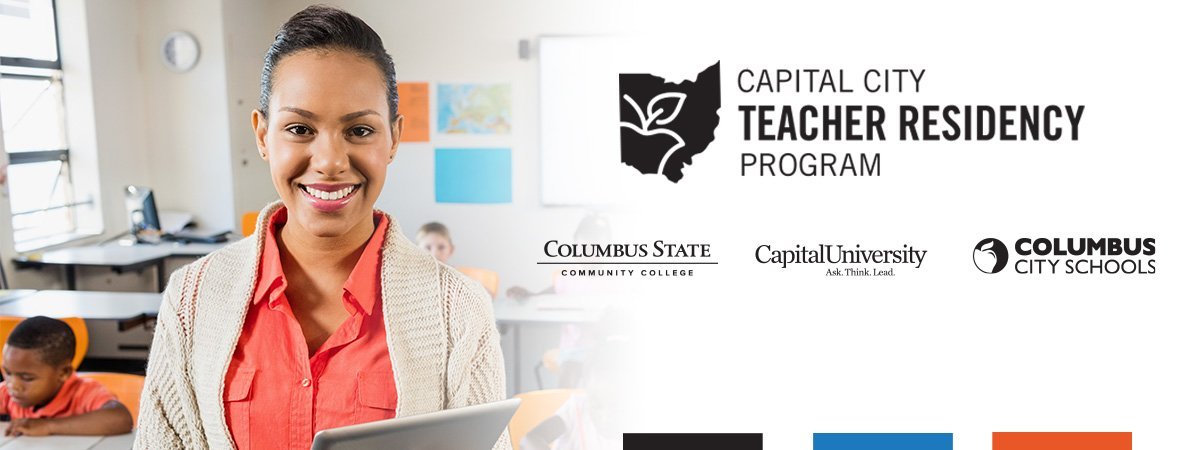Capital City Teacher Residency: A Response to Educator Shortages
Photo source: Capital University (Ohio): https://www.capital.edu/academics/continuing-education/capital-city-teacher-residency-program/
Program Description and Purpose
The Capital City Teacher Residency (CCTR) program allows enrolled students to become licensed teachers while being employed by Columbus City Schools (CCS). After completion of the program, candidates are guaranteed a teaching position in their licensure area within CCS.
Partners
The CCTR program is a partnership among Columbus State Community College, CCS, and Capital University. The program was developed with funding from the Ohio Department of Higher Education through a grant ending in June 2024; however, the program has established a sustainable and scalable approach for future cohorts of students by using state scholarships to help cover student tuition.
Eligible Participants
Individuals can enter the CCTR program if they have an existing associate or bachelor's degree, if they have some or no college credits, or if they are an existing CCS employee or eligible student. Depending on the degree and credits that individuals bring to the program, coursework at Columbus State Community College may be required before beginning the 2-year CCTR program at Capital University. The cohort of students who are currently completing the CCTR program have many backgrounds and include those who are current CCS employees, career changers, students who transferred credits from Columbus State Community College, and undergraduate students who are pursuing a teaching career.
How it Works
The CCTR program offers individuals the opportunity to earn their education licensure, obtain their bachelor’s degree, and earn an income in an educational setting through a paid practicum experience in CCS. Students complete online asynchronous Capital University coursework while being employed in CCS as a paraprofessional, an instructional assistant, a building substitute, or a day-to-day substitute teacher. CCTR students convene on campus monthly to connect and reflect as a cohort.
In addition to the paid practicum experience, all CCTR students are eligible for the Grow Your Own Teacher Scholarship Program, which supports some of student tuition costs (Ohio’s Grow Your Own Teacher Scholarship Program is authorized by Ohio Revised Code § 3333.393 and 3333.394). CCTR program completers are eligible for a full-time teaching position in the CCS district after they complete the CCTR program.
A representative of the CCTR program emphasized how critical it is for the program to be flexible and adaptable to the needs of students and to support students as they are working and attending school full time. Faculty at Capital University adapt coursework to meet student needs and provide extra support for students based on their needs (e.g., communicating and advising candidates about their experiences in schools, creating flexible deadlines so students can complete their coursework during busy school seasons).
Benefits for Participants
The combination of the paid clinical experience, flexibility and adaptability of the courses and program, community building among students and faculty, direct support throughout the program, and guaranteed employment make the program successful. A representative of the CCTR program says that the current (first) cohort of students feel connected, they enjoy being in the field, and they have the unique experience of connecting theory to practice in real time—that is, implementing their learning and reflecting on their successes and challenges with each other and faculty. For example, students reflect and receive direct feedback from faculty on their teaching through monthly recorded lessons. The students in the program are incredibly passionate about the work they are doing. Many of these students have wanted to obtain licensure but have not had the program opportunity and financial support needed.
CCS uses the Ohio Department of Higher Education Grow Your Own Teacher Scholarship Program for individuals accepted into the program. All accepted and enrolled CCTR individuals are eligible for the scholarship. The scholarship funds provide up to $7,500 per year for 4 years in exchange for committing 4 years in the district within 6 years of graduation.
Students are guaranteed paid employment in CCS as a building substitute, a day-to-day substitute, a paraprofessional, or an instructional aid as part of their enrollment in the CCTR program.
Students are guaranteed employment at CCS in their licensure area after they complete the CCTR program.
Benefits for the District
The CCTR program was originally developed to respond to a substitute teacher recruitment need in CCS and to also grow the number of high-quality teachers in Ohio. Partnering with Capital University and Columbus State benefits the district by expanding opportunities (in terms of preparation, funding, and employment) for interested candidates and knowing candidates will be well supported and well prepared for their work in CCS.
Areas of licensure include primary childhood education, adolescence to young adult education, and/or intervention specialist (students can earn bachelor’s degrees by taking additional classes). These content areas were selected based on the needs of CCS (i.e., a high need for intervention specialist) and the best content area for developing and piloting the program (i.e., primary childhood education). In the future, the CCTR program hopes to expand to additional licensure areas and partner with other districts.
Works Cited and Further Information
Information on the CCTR program can be found on the Capital University website, which was consulted for this summary.
The following sources also were consulted when crafting this summary:
CCS invests in staff with Grow Your Own Teacher Scholarship Program
Capital University launches Capital City Resident Educator Program
Additionally, an interview with Dr. Nisreen Daoud, director of the CCTR program and assistant professor, was conducted.

